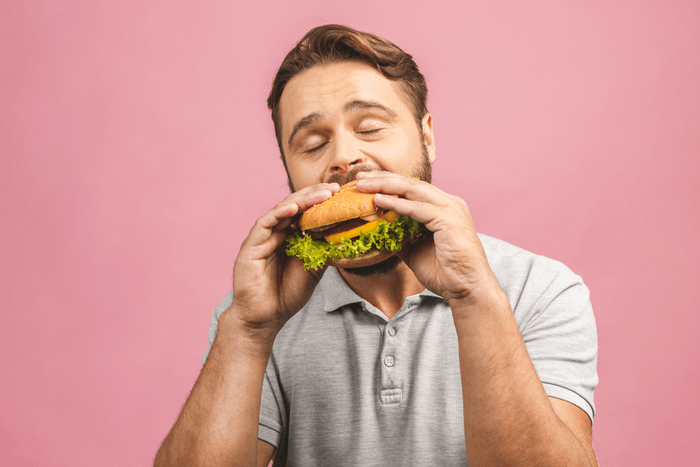Can You Eat Whatever You Want When Intermittent Fasting?
Written by Andrew Brewer. ⚕️Reviewed and fact checked by our medical team.
One of the most attractive features of intermittent fasting is that it focuses more on when you eat than what you eat. In some programs, you don’t even restrict your calories, so technically, you can eat whatever you want when intermittent fasting. In reality, you’ll want to consider your goals.
If your goal is to lose weight, you don’t want to binge during your eating window. You want to make sure you’re in a calorie deficit to lose weight, so you want to burn through more calories than you’re eating. If you binge on high fat, high-calorie meals during your eating windows, it’s less likely that you’ll burn enough calories and sugar for your body to tap into its fat store.
Intermittent fasting isn’t about restricting what you eat within reason. You can still eat your favorites like pizza, fast food, and sweets. However, it’s suggested that you do so in moderation as they won’t provide you with the nutrients you need to sustain yourself through your fasting window. It’s more likely that you’ll crash and give in without measured thought of your food.
Some intermittent fasting programs do restrict the type of food you can eat. For example, you cannot eat certain artificial sweeteners on a gut-healing fast. Fasting apps can help you keep your fasting rules straight as you get used to the new programs.
Key Takeaways
- Intermittent fasting is more about when you eat than what you eat, but you should still be mindful of your food choices to achieve your goals.
- Consuming nutrient-dense foods during your eating windows can help you feel full longer and make fasting windows easier to handle.
- Indulging too much during your eating windows can have negative consequences on your health, including digestive issues, so it’s important to be strategic with your food choices.
- Fasting apps can be helpful for keeping track of your fasting rules and ensuring you stay on track.
- Adopting an intermittent fasting lifestyle can have significant benefits, but it’s important to be consistent and make healthy choices.
What Happens If I Eat Whatever I Want During Intermittent Fasting?
The best-case scenario is nothing happens to you – but that’s not necessarily a good thing. You may not lose weight, lower your blood sugar, or get any benefits from intermittent fasting if you don’t watch what you’re eating. Chances are you have a purpose for intermittent fasting, so you don’t want to undermine it by indulging too much.
The worst case is that you may develop digestive issues like diarrhea or constipation. This isn’t a side effect of the fasting windows but the eating periods. After fasting, you need to ease your body into eating again. Eating too much too fast can make you feel sick, as will eating food that’s too heavy and greasy. Your body will almost go into shock and start trying to purge the food as fast as it can, so be careful with what you’re eating, even if you don’t need to watch your calories.
Why Eating What You Want Isn’t the Best Idea
Intermittent fasting may be attractive because you don’t have to limit yourself, but you should take care of what you’re eating. Nutrient-rich foods packed with protein, fiber, and healthy fats will help you feel full longer, making the fasting windows easier to handle. High-calorie but nutrient-deficient foods will do the opposite.
That doesn’t mean you can’t indulge every now and then, but you should be strategic with your eating windows to make the most of your intermittent fast. Your actions should help you reap the most benefits as you embrace this new lifestyle. Intermittent fasting can change your life if you let it.
FAQ
-
Can you eat whatever you want when intermittent fasting?
No, you still need to pay attention to the food quality during your eating window.
-
What are some foods to avoid during intermittent fasting?
It’s best to avoid processed and junk food, sugary drinks, and foods with a high glycemic index.
-
What foods are recommended during intermittent fasting?
Focusing on whole, nutrient-dense foods such as fruits, vegetables, whole grains, lean proteins, and healthy fats is best.
-
Can you lose weight if you eat unhealthy foods during your eating window?
It’s possible to lose weight but it may be less effective or sustainable in the long term. Eating unhealthy foods can also have negative impacts on your overall health.
-
Do you need to count calories during intermittent fasting?
Counting calories is unnecessary, but it’s still important to be mindful of portion sizes and ensure you’re not overeating during your eating window.
-
Is it okay to have cheat days while intermittent fasting?
Having occasional cheat days is okay, but it’s important not to let them become a regular occurrence and to get back on track with your healthy eating habits.
-
How can I make sure I’m getting enough nutrients while intermittent fasting?
Focus on eating various nutrient-dense foods during your eating window, and consider taking a daily multivitamin or other supplements if needed.
-
Is it safe to exercise while intermittent fasting?
Yes, it’s safe to exercise while intermittent fasting. However, listening to your body and adjusting your workouts as needed is important.
